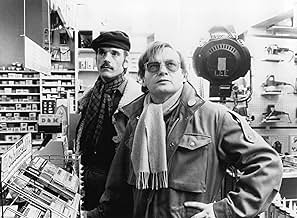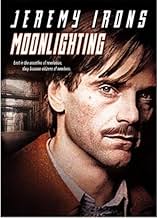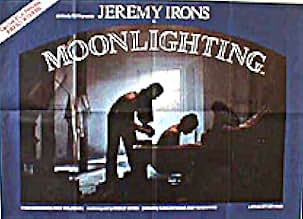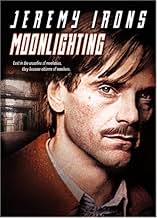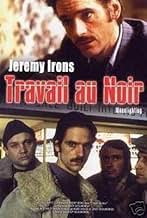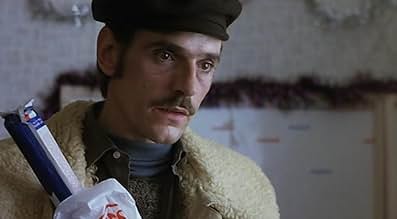Nowak (Irons), a Polish contractor, leads a group of workmen to London so they can provide cheap labor for a government official based there. Nowak must manage the project and the men as the... Read allNowak (Irons), a Polish contractor, leads a group of workmen to London so they can provide cheap labor for a government official based there. Nowak must manage the project and the men as they encounter the temptations of the West and loneliness and separation from their families.... Read allNowak (Irons), a Polish contractor, leads a group of workmen to London so they can provide cheap labor for a government official based there. Nowak must manage the project and the men as they encounter the temptations of the West and loneliness and separation from their families. Nowak is the only one of the group who speaks English, and he uses this as a tool over hi... Read all
- Awards
- 3 wins & 3 nominations total
- Wolski
- (as Jirí Stanislav)
- Builders' Merchant
- (as Mike Sarne)
- Director
- Writer
- All cast & crew
- Production, box office & more at IMDbPro
Featured reviews
Written and directed by Polish playwright Jerzy Skolimowski, "Moonlighting" is a low key film that focuses on the interaction among the four isolated men, who live, work, and sleep in the flat. Nowak, Jeremy Irons in a quiet understated performance, is the only one to regularly venture outside to find food and building materials. Faced with dwindling funds, Nowak devises various methods to shoplift goods or outwit store managers and cleverly double his grocery purchases. While sheer luck often aids Nowak with his dodgy schemes, the English shopkeepers seem remarkably dim, and the immigration officer on arrival at Heathrow was unbelievably gullible.
The story takes place in 1981, the year the film was shot, and, while Nowak struggles with finances and an approaching deadline, Poland stumbles into a military coup, and martial law is imposed. With phone lines cut between London and Warsaw and all flights to Poland canceled, Nowak must conceal the events unfolding at home from his compatriots to keep them focused on finishing the flat. Because three of the four principal actors have few lines and those only in Polish, the film concentrates on Irons, who ably carries the film. Although much of the action takes place inside the flat, Skolimowski's direction manages to avoid a claustrophobic feel. However, "Moonlighting's" leisurely pace does require patience. But Nowak's sharp wits and audacity, fueled by his determination to complete the assigned task despite the mounting odds, make for engrossing viewing. Skolimowski's "Moonlighting" is a small, overlooked film with many rewards for discerning viewers to discover.
Can see whole-heartedly why 'Moonlighting' was so highly recommended, and would do the very same with fellow Jeremy Irons fans who haven't yet seen the film or with anybody looking for a non-UK/US film to watch. It really is deserving of all the praise it gets and is actually deserving of more in my view, actually know a lot of people who haven't even heard of it let alone not seen it and that really should not be the case. Always try to be subjective and hate it when so many people try to force their opinions onto others, but it does irk me sometimes when you have so many heavily marketed films that are sometimes mediocre at best or ones that are good but not that much. And then you have a film as great as 'Moonlighting', one of the best films of its year and of its subject, that despite critical acclaim is not marketed enough. In favour of films that audiences are more likely to see and have concepts and stories that they may be more likely to warm to perhaps. That should not have been, or be, the case, it deserved much better than that.
Yes the deliberate pace may test the patience for some, it is wholly dependent on the viewer, but to me that was not in any way a fault. Do think that the very end could have been rounded off a little more, though the climactic moments are powerful and the final shot is unforgettable.
Visually, 'Moonlighting' looks good. The setting has a lot of atmosphere that fits the tone of the film ideally and it's filmed with grit and style while bringing a claustrophobic edge that helped make things more powerful. Jerzy Skolimowski, exiled at the time, directs assuredly and never loses the vigour. Furthermore the script is an intelligently written one with some humorously satirical moments in deadpan fashion, and while more familiarity with the subject may help the story enthralled, entertained and moved, with a few disturbing twists in the mix like the identity of the only one who knows what's really happening in Poland. The shoplighting sequence is a major highlight, and there is a fair share of tension and poignancy.
Absolutely agree with anybody who says Irons' performance here is one of his finest, both pre-'Lolita' (and then his career became hit and miss when it became increasingly difficult to tell what to do with him or find enough roles that played to his strengths, that's my take though) and ever. It is graceful and understated but also full of authority and not many people are as good as Irons too when it comes to narration. The other performances are all great, but Irons is the one that the viewer remembers.
In conclusion, really great. 9/10
A bunch of Polish builders arrive in London to renovate a house belonging to their boss. The foreman, Nowak, played quietly and brilliantly by Jeremy Irons, is the only one that speaks English. Their money is sufficient only for the tools, building materials and barely surviving.
This is a slow-burner film with every face hiding a deep anxiety, anger or fear, it's a wonderful experience for those who can appreciate true cinema. Irons carries the film single-handedly (often with inner monologue, since there are not many people to talk to) with few facial expressions but each one telling books of emotions.
You can literally taste the frustration of every character: the builders, working hard but not able to enjoy the western life that they finally see but cannot touch, are angry. (There's a very funny scene where one of them wants to buy Coca Cola on their first trip to the supermarket, exclaiming "Coke!" with childish glee, but their money is so limited that they can't afford even that.) The neighbors are angry, because the builders make too much noise. Most of all, Nowak is angry for a lot of reasons, although he never shows it: He misses his wife, and has growing doubts about the intentions of his boss about her. He speaks English, but doesn't always understand the subtleties of what the British people say. He has to deal with the men, the meager finances, the neighbors, the skip workers, and of course the house itself, which looks like it will come down if someone sneezes hard.
Two things change the course of their dull days dramatically: the money obviously won't last, and Nowak starts to come up with little schemes to get extra food from the supermarket using the same receipt. He's quite inept, but lady luck is often on his side. But most importantly, he hears that a military coup has taken place in his homeland. He faces a terrible dilemma: does he tell the men? He must, since they all have families at home, but then the work will never finish, and they really need the income. (There's no way they'll be allowed back, anyway) Or does he not tell them? Then the work may finish on time, but how will he keep the men from finding out themselves, when their weekly phone calls from home suddenly stop?
It's basically a hero story. What's a hero? A Marvel guy in leotards, speaking in one-liners? Or a man who does the right thing, at his own cost, knowing that he will never be appreciated? Nowak does the right thing. He hides the truth about the coup, thus keeping the men from rushing to the border and probably getting arrested. He gets the work done on time. He sees attractive women, but never chases them: they only remind him of how much he loves and misses his wife. He steals, but not from regular people: he only steals from the supermarket, and steals food and basic necessities only. And all the while he keeps his mouth shut. He doesn't "share his journey" or any other nonsensical stuff we love oh so much nowadays. He doesn't expect rewards, admiration, medals, approval, praise. He does the right thing, because he's a man, and that's what a man does. Even the final scene, where he tells the men about the coup and gets beaten by them for hiding the truth so long, is a tribute to this: He doesn't try to justify it, he knows he did the right thing but also hurt his men, so he takes their punches like a man.
As one other reviewer mentioned, it's a movie for the discerning viewer. There's nothing wrong with Marvel movies or action movies, but there's a lot wrong with thinking that's what movies are all about.
Did you know
- TriviaSkolimowski's Kensington house in West London was in real life undergoing renovation at the time the film was made. (Moonligthing, 1982)
- GoofsWhen one of the workers paints the door frame on the outside of the building and clears away the electrical wire, part of the lintel is already painted white. Later, when Banaszak climbs up the ladder, the lintel has not yet been painted. Then, in the close-up in which he gets the electric shock, a good part of the lintel is painted white again, and in the next shot, when he falls off the ladder, only a tiny part is painted white again.
- ConnectionsFeatured in At the Movies: The Best Films of 1982 (1983)
- How long is Moonlighting?Powered by Alexa
Details
Contribute to this page


